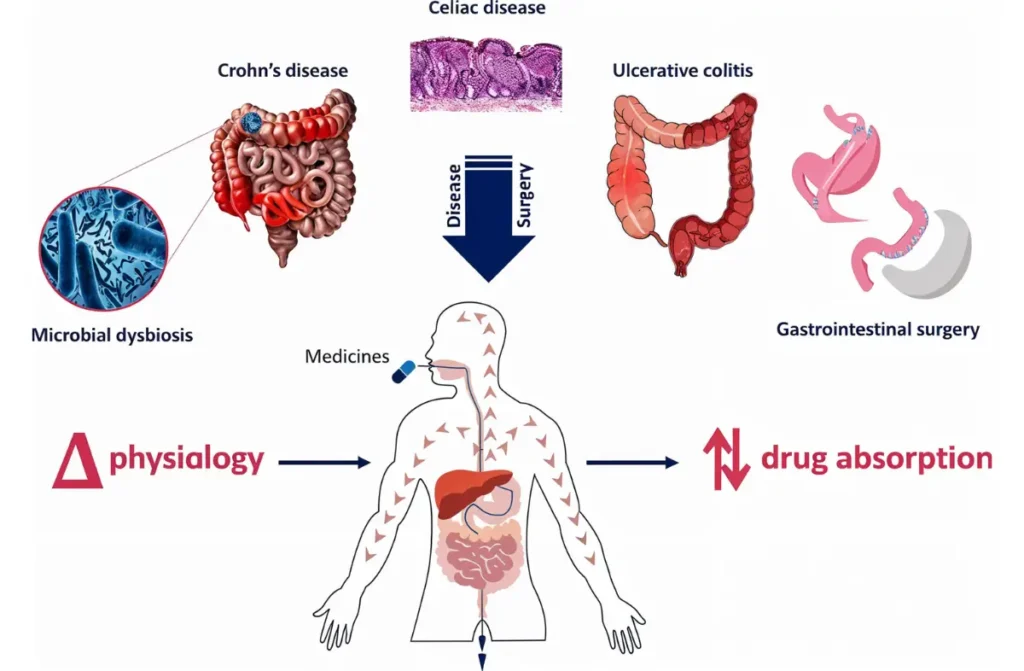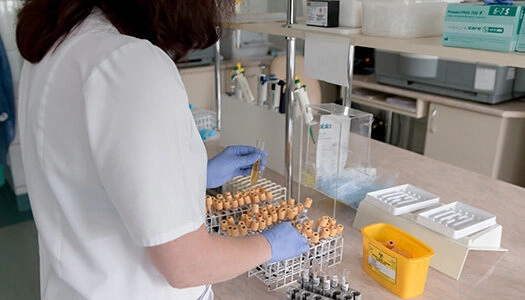At The Arc Gut Clinic, we emphasize the connection between gut health and overall well-being. All disease begins in the gut, a concept that dates back to Socrates, who believed that a healthy gut was essential for preventing disease. Today, modern medicine backs this ancient wisdom, proving that the state of our gut microbiome affects not only digestion but also immunity, inflammation, and even mental health. Understanding how all illness starts in the gut is critical to improving your health. Let’s dive into why the gut is so important, the risks of an unhealthy gut, and how it can lead to disease.
Why Is A Healthy Gut Important?
A well-functioning gut is more than just a digestive powerhouse; it impacts numerous bodily functions, including:
- Nutrient Absorption – A balanced gut microbiome ensures your body efficiently absorbs essential vitamins and minerals.
- Immune System Support – Nearly 70% of the immune system resides in the gut, making gut health crucial for fighting infections.
- Mental Health Connection – The gut-brain axis links gut bacteria to mood, anxiety, and depression.
- Chronic Disease Prevention – Poor gut health is linked to autoimmune diseases, diabetes, and even cardiovascular issues.
- Inflammation Control – An unhealthy gut can lead to chronic inflammation, which is a major factor in various illnesses.
Since all disease begins in the gut, focusing on improving digestive health can significantly enhance overall well-being.

7 Top Tips for Good Gut Health
Maintaining a healthy gut requires a conscious lifestyle and dietary choices. Here are seven proven strategies:
- Eat More Fiber – High-fiber foods like whole grains, fruits, and vegetables nourish good gut bacteria and promote digestion.
- Include Probiotics & Fermented Foods – Yogurt, kimchi, sauerkraut, and kefir help introduce beneficial bacteria into your system.
- Limit Processed Foods & Sugar – Excess sugar and artificial ingredients can disrupt the gut microbiome, leading to imbalance and inflammation.
- Stay Hydrated – Drinking plenty of water supports digestion and helps maintain a balanced gut environment.
- Manage Stress Levels – Chronic stress can negatively impact gut bacteria, so practices like meditation, deep breathing, and exercise can help.
- Prioritize Sleep – Poor sleep affects gut health, leading to imbalances that can cause digestive issues and inflammation.
- Exercise Regularly – Physical activity promotes a diverse gut microbiome, improving overall digestive health.
Disease Risk and Your Gut
with many chronic illnesses being linked to an imbalance in gut bacteria. The gut is home to trillions of microorganisms that influence various body functions, including digestion, immunity, and metabolism. Socrates is the one who said all disease begins in the gut the father of modern medicine, is often credited with this wisdom. When these microorganisms become unbalanced—a condition called dysbiosis—it can contribute to a wide range of diseases, such as heart disease, diabetes, and autoimmune disorders.
- The gut microbiome plays a role in regulating metabolism, and an imbalance can lead to obesity and insulin resistance.
- Disruptions in the microbiome can trigger inflammation, contributing to chronic diseases like cardiovascular disease and cancer.
- A weakened gut microbiome can impair immune function, leaving the body vulnerable to infections and autoimmune diseases.
Research confirms that all disease begins in the gut, as gut imbalances affect the entire body. Supporting gut health with proper nutrition and probiotics can reduce the risk of these conditions. This reinforces the idea that a healthy gut is foundational to disease prevention. Do all diseases start in the gut? Many chronic illnesses can indeed be traced back to an unhealthy gut, highlighting the importance of maintaining gut health to prevent disease.
Manipulating the Gut Microbiome
The gut microbiome consists of trillions of microorganisms that influence digestion, immunity, and even mental health. When imbalances occur, they can contribute to inflammation, metabolic disorders, and autoimmune diseases. Therefore, manipulating the gut microbiome can significantly impact health outcomes.
- Probiotics and Prebiotics: Consuming probiotic-rich foods like yogurt and fermented vegetables helps introduce beneficial bacteria, while prebiotics (found in fiber-rich foods) provide nourishment for these microbes.
- Dietary Changes: A balanced diet, high in fiber and low in processed foods, supports gut integrity and reduces inflammation.
- Reducing Antibiotic Overuse: Excessive antibiotic consumption disrupts gut microbiota and may lead to long-term health complications.
- Managing Stress: Chronic stress negatively affects gut bacteria, making mindfulness practices and relaxation techniques essential for gut health.
All disease begins in the gut, and by adopting a lifestyle that nurtures gut bacteria, we can enhance our immune response, digestion, and overall well-being.
How Does Diet Affect Our Gut Microbiome and Our Health?
The gut microbiome is highly responsive to dietary patterns, and the foods we consume play a major role in determining microbial diversity, inflammation levels, and immune response. When questioning do all diseases start in the gut, one must consider the profound impact diet has on this internal ecosystem.
- Fiber-rich foods such as fruits, vegetables, and legumes enhance the growth of beneficial bacteria and support digestion.
- Probiotic-rich foods like yogurt, kefir, and fermented vegetables replenish healthy gut microbes.
- High sugar and fat intake promotes harmful bacterial growth, increasing the risk of chronic inflammation.
- Artificial additives and preservatives disturb the natural microbial balance.
- Hydration and micronutrients play crucial roles in maintaining gut lining integrity and microbial function.
A nutrient-dense, varied diet supports the production of short-chain fatty acids (SCFAs), which regulate inflammation and protect the intestinal barrier. Such balance is essential for reducing the risk of systemic diseases, further validating the inquiry—do all diseases start in the gut?
Factors Affecting Gut Health
While diet remains central, other factors influence gut health and determine the resilience of the microbiome. As medical science continues to explore the question, who said all disease begins in the gut, attention turns to how lifestyle, medications, and environment shape our internal health.
- Antibiotic overuse: Depletes beneficial bacteria and may lead to microbial imbalance.
- Chronic stress: Alters gut-brain communication and affects microbial diversity.
- Lack of sleep: Weakens the immune response and disrupts microbial stability.
- Low physical activity: Reduces gut motility and impairs bacterial turnover.
- Environmental toxins: Pollutants and heavy metals can damage the gut lining.
Genetics and age also influence the composition of the microbiome, but lifestyle choices remain a powerful tool for regulation. It’s no coincidence that healthcare experts frequently reflect on who said all disease begins in the gut, as mounting evidence reinforces this timeless perspective.
When exploring long-term wellness strategies, reflecting on the idea do all diseases start in the gut can help guide smarter, preventive health choices that prioritize gut integrity and immune balance.
Effects of Chronic Inflammation
Chronic inflammation originating in the gut is a significant factor in the development of many diseases. All disease begins in the gut, as the gut microbiome influences inflammatory responses throughout the body. When the balance of bacteria in the gut is disturbed, it can lead to persistent low-level inflammation, which has been linked to diseases like arthritis, inflammatory bowel disease (IBD), and even mental health disorders such as depression and anxiety.
- Chronic gut inflammation can damage the intestinal lining, leading to leaky gut syndrome, where harmful substances leak into the bloodstream.
- These substances can cause systemic inflammation, contributing to diseases like heart disease, liver damage, and autoimmune disorders.
- Inflammatory conditions like Crohn’s disease and ulcerative colitis can be worsened by inflammation in the gut.
By addressing gut inflammation through diet, probiotics, and lifestyle changes, we can reduce the risk of these diseases. Supporting the gut microbiome is essential in preventing the chronic inflammation that drives many health problems. all illness starts in the gut and by managing inflammation, we can support long-term health.
Endotoxins and Leaky Gut
One of the most damaging effects of an unhealthy gut is the phenomenon known as leaky gut, where harmful endotoxins and bacteria leak into the bloodstream. All disease begins in the gut, as these endotoxins trigger widespread inflammation, contributing to various chronic diseases.
- Leaky gut occurs when the tight junctions between intestinal cells loosen, allowing toxins to pass through and enter the bloodstream.
- Once these toxins enter the bloodstream, they cause systemic inflammation, which can contribute to conditions such as heart disease, liver damage, and autoimmune disorders.
- Endotoxins can disrupt the gut microbiome, leading to an imbalance that worsens the effects of leaky gut.
Improving gut health through diet and supplementation with probiotics can help prevent the development of leaky gut and endotoxemia. This is another example of how all illness starts in the gut as endotoxins originating in the gut have far-reaching effects on the rest of the body. Supporting the gut microbiome can help prevent these harmful effects, reducing the risk of developing systemic diseases.
Implications of the Western Lifestyle
Modern Western lifestyles, characterized by high consumption of processed foods, sedentary habits, and stress, have profound effects on gut health. The increased prevalence of autoimmune disorders, obesity, and metabolic syndromes may be linked to gut dysbiosis.
- Processed Foods and Artificial Additives: These disrupt the gut barrier and promote inflammation.
- Lack of Dietary Diversity: Diets low in fiber and plant-based foods reduce microbial diversity, which is essential for gut health.
- Chronic Stress and Poor Sleep: These factors alter gut bacteria composition, potentially leading to digestive disorders.
- Overuse of Medications: Excessive reliance on antibiotics, NSAIDs, and acid reducers negatively impacts gut flora.
Addressing these issues is crucial because all disease begins in the gut, and making informed lifestyle choices can mitigate the risks associated with poor gut health.
Unhealthy Diet and Endotoxemia
A poor diet can contribute to endotoxemia, a condition characterized by a build-up of harmful endotoxins in the bloodstream, originating from the gut. All disease begins in the gut, as the foods we eat directly affect the health of the gut microbiome. Diets rich in processed foods, unhealthy fats, and sugars promote the growth of harmful bacteria, which can lead to gut dysbiosis and inflammation.
- Diets high in sugar and fat encourage the growth of harmful bacteria, while fiber-rich foods support beneficial bacteria.
- These imbalances in the microbiome contribute to chronic diseases like obesity, diabetes, and cardiovascular disease.
- A diet full of processed foods increases inflammation in the gut, leading to endotoxemia and making the body more vulnerable to disease.
Improving gut health by incorporating nutrient-dense, fiber-rich foods, as well as probiotics, can help maintain a healthy balance in the gut microbiome.
Conclusion
All disease begins in the guts of Human —a statement that reflects the increasing understanding of the role the gut plays in overall health. Whether it’s reducing inflammation, supporting immunity, or regulating metabolism, the health of your gut is central to preventing chronic diseases. At The Arc Gut Clinic, we are committed to helping you maintain a healthy gut through proper nutrition and lifestyle changes. all illness starts in the gut so by focusing on gut health, you can improve your overall well-being and reduce the risk of developing chronic diseases. Contact us today to learn more about maintaining a healthy gut.
Read also Tips to Improve Digestion.









